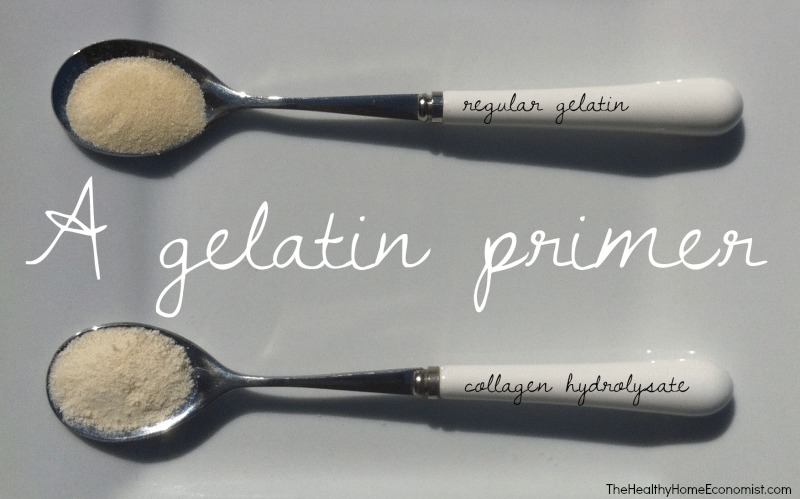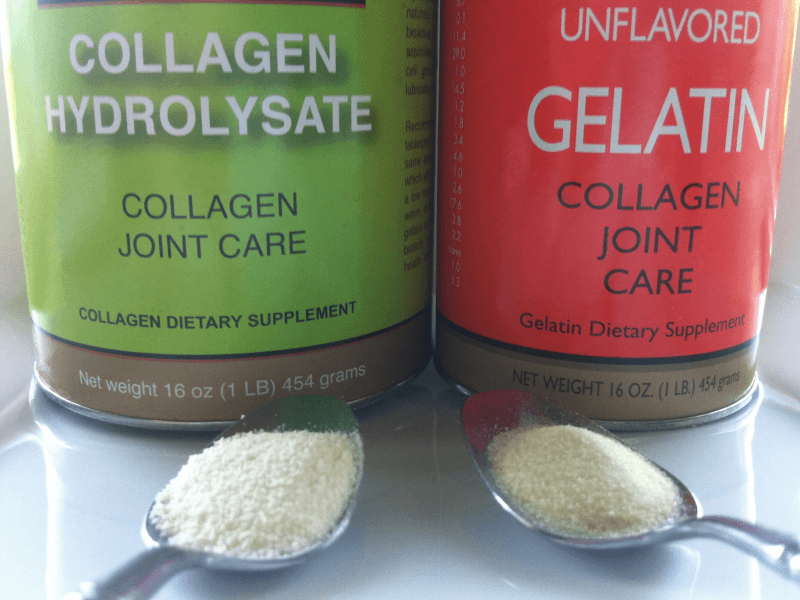The important differences between collagen hydrolysate (peptides) and gelatin, and a comparison of both to identify which one is better for anti-aging, cooking and overall health.

Gelatin (also known as cooked collagen) is a wonder food with anti-inflammatory and anti-aging qualities, as it helps to fill in the missing amino acids (the building blocks of proteins) in the standard American diet.
According to Ray Peat, Ph.D., “The degenerative and inflammatory diseases can often be corrected by the use of gelatin-rich foods” (1).
One of the greatest benefits of using gelatin is to help balance our amino acid intake. Because collagen makes up approximately 50% of the whole animal, gelatin can be used to help create a more complete protein balance in our diet. The standard American diet tends to be very high in muscle meats (such as beef, chicken, lamb, and turkey), which when not balanced by other proteins (such as eggs, fish, dairy, shellfish, organ meats) can contribute to inflammation over time (2).
The benefits of gelatin are many as it has a unique and very non-inflammatory amino acid profile, primarily consisting of glycine, glutamic acid, proline, and alanine (tryptophan and several other amino acids are completely missing).
Although these are non-essential amino acids (meaning your body can make them), many malnourished and over-stressed livers are not able to manufacture all the non-essential amino acids in the amounts demanded by the body. The liver needs an abundance of these proteins to keep functioning optimally, particularly to fuel phase 2 detoxification. This helps your body detox or “take out the trash” in our toxic world, reducing inflammation!
Gelatin versus Collagen Hydrolysate

Although the most nutrient-dense source of gelatin is homemade bone broth (since it contains minerals as well), powdered versions offer a more convenient way to consistently get it into your diet.
Processing
I spoke personally with the president of a company that produces collagen and gelatin to get the low down on exactly how collagen hydrolysate (also called hydrolyzed collagen) and gelatin are processed.
According to this reputable source, the company uses grass-fed beef hides for the raw material for their bovine products. The split hides (under the hair where the collagen lies) are put into an alkaline solution and held for a number of days where the material is broken down into smaller pieces of skin.
Next, it’s acid back washed and pumped into cooking kettles which separate tallow, skin, and collagen. The collagen is then filtered and put through a vacuum evaporator at 212 degrees F (a very delicate process). After evaporation is complete there is a four-second sanitation process at 240F degrees that kills any unwanted bacteria. At this stage, it is classified as pure collagen.
Collagen hydrolysate (quality sources): The collagen is stored in a holding tank at a higher temperature to reduce the molecular weight cleaving the amino acid bonds. This process is called hydrolysis. At the appropriate time, it is then introduced to the spray dryer whereas the product is made into a dry powder.
Gelatin (quality sources): The collagen is sent to a votator, chilled and solidified, pumped onto a drying belt, and is now considered gelatin. It is dried to under 12% moisture, milled to a granular specification and packaged.
How to Best Use Each Type of Collagen
Collagen hydrolysate – The hydrolysis process described above renders the gelatin powder more easily digestible and appropriate for those with digestive weakness and sensitivity. I find this type of gelatin best used as a protein powder with careful dosing (see Important Note below).
Mix collagen hydrolysate in drinks, shakes, smoothies, ice cream, or add a tablespoon to your favorite recipe to give it an anti-inflammatory protein boost. It will dissolve in cold liquids easily.
Having collagen hydrolysate with a meal that contains muscle meat can help balance the amino acid profile that enters your bloodstream. “If a person eats a large serving of meat, it’s probably helpful to have 5 or 10 grams of gelatin at approximately the same time, so that the amino acids enter the bloodstream in balance.” Ray Peat, PhD. (3)
Gelatin – Regular gelatin is only hot water-soluble and best used to create foods that gel (fruit snacks, healthy jello, homemade marshmallows, desserts, etc).
How Much Do You Need?
Individual needs will vary, but most people can start off with about ½ -1 tablespoon per day of collagen hydrolysate (either as powder or capsules), and increase by 1 tablespoon every two weeks or so as tolerated.
According to Ray Peat Ph.D., gelatin can make up about 30% of total protein intake, which for the typical person is about 3-6 TBL of gelatin per day (1 tablespoon of gelatin is 6 grams of protein).
Contraindications
Remember not to get too carried away with either gelatin or peptides. Adding too much too quickly can cause digestive issues: bloating, loss of appetite, stomach ache is just a few side effects.
It’s important to remember that more is not always better, especially if you are adding it to your diet for the first time.
Gelatin should be used in addition to a nutrient-dense diet and not to replace real food like homemade bone broths and grass-fed meats.
Where to Find the Best Collagen and Gelatin
Perfect Supplements and Radiant Life are the only two companies that currently offer a quality source of both collagen and gelatin that is gently manufactured and third-party tested/certified for purity (no glyphosate residue risk!).
These quality protein supplements blend easily into the beverage, smoothie, or food of your choice. Choose between grass-fed collagen, and gelatin both available in large, economical canisters.
Marine collagen is also an option for those fish-eating vegetarians.
This supplement is also available in very convenient Type II collagen capsules. This is a great option for traveling.
References
Great Lakes FAQ
Gelatin, stress, longevity by Ray Peat
More Information
The Reason You Need More Gelatin in Your Diet
5 Reasons Your Stock Won’t Gel
Bulletproof Coffee (even with added peptides) Shoots You in the Foot








Informative article. hydrolized seems to be the upgrade from regular gelatin and it also stir better.
Do Collagen peptides have any anticoagulent properties, recently tried making some healthy jello and my sister decided to add some along with the gelatin powder and it never set.
You should use just gelatin for that.
My daughter has Marfan Syndrome which is a disorder of the connective tissues. She is also gelatine intolerant (not anaphalaxis). She can consume broths with no issues but jello and sweets with gelatine make her throat swell and become itchy. We have not yet done allergy tests for gelatine. I believe these two issues are correlated btw.
I have been researching supplementation for assisting the building and maintenance of connective tissues and collagen keeps coming up. Given bone broths have no negative affects on her do you think a collagen supplement is worth trying? I would expect the worst case scenario would be irritation if taken in a low dose
hi there I am confuse which to buy gelatin or collagen hydrolysate best for low back slip disk ?
Hello there,
Thanks for the info on gelatin, I suffer from IBS could you tell me if it will help with my symptoms and how much to take.
cheers
Can the collagen hydrolase be used to make “jello” or will it not firm up like regular gelatin?
Thanks!
My husband and I have been using Vital Proteins Collagen Peptides for about 2 months. We either add it to morning coffee or a daily smoothie. My husband has noticed improvement in knee pain and I’ve experienced a welcomed slow steady weight loss. Our energy level is up and cravings for snacks diminished. But I mentioned using hydrosylated protein to a Integrative Medicine MD recently and he discouraged it’s use with the explanation that dietary protein should come from a variety of sources – animal, fish, nuts, legumes, etc Then I read concerns about the possible transmission of mad cow disease (bovine spongiform encephalopathy) from beef sourced peptides/gelatin which has freaked me out completely. What do you think about this risk?
Totally agree with that doctor … collagen hydrolysate is no substitute for varied proteins in the diet. Collagen hydrolysate is not a complete protein by any means and should be spplemenal only. I don’t think clean, grassfed collagen hydrolysate is a risk for mad cow.
Has anyone ever experienced headaches resulting from the addition of Collagen Hydrolysate? I have been adding a scoop of Vital Proteins to my daily bulletproof coffee. Since this addition, I have been suffering mysterious tension headaches on a daily basis. Not sure if the headaches may be related to the gelatin powder? I would appreciate any advice! Thank you! 🙂
Hi, thanks for your great report on meeting with the president of Great Lakes.
It very much made my eyes bug out at the part where you say the hides are “acid back washed”. Can you please let me know your personal thoughts on this? (and/or any further insight he gave into that process?) … perhaps it’s scarier than it sounds? 🙂
Thanks!
I do think this processing very likely creates some free glutamatic acid (MSG), but I don’t have any reaction to it and am extremely sensitive, so my personal opinion is that it is a very small amount.